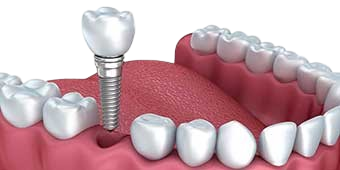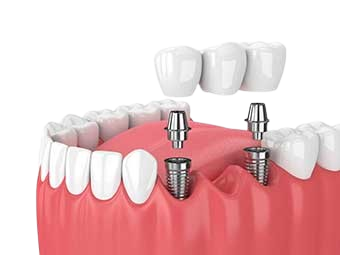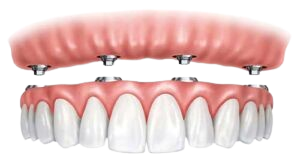Affordable Dental Implants in Michigan
Dental implants can help you smile more confidently and provide several advantages over other teeth replacement options.

A Permanent Solution to Tooth Loss
Dental implants offer an optimal solution for replacing missing teeth, providing a permanent and natural-looking restoration that feels just like your own teeth. Unlike dentures or bridges that can slip or become loose over time, dental implants are securely anchored into your jawbone, mimicking the root of a natural tooth. This not only restores full functionality for biting and chewing, but also promotes long-term jaw health by stimulating bone growth. If you’re looking for a permanent solution to missing teeth that allows you to eat, speak, and smile with confidence, dental implants at New You Dental Center can transform your smile and your life. We have five locations in Michigan and well-trained dentists with years of experience in dental implant surgery, so you can be confident you’re in good hands.
Benefits of Dental Implants
Permanent: dental implants are permanent and designed to last a lifetime. Patients can rarely tell the difference between a tooth supported by an implant and a natural tooth.
Prevent Bone Loss: dental implants prevent bone loss that normally occurs underneath missing teeth. This helps maintain the size and shape of your jaw.
Confident Smile: dental implants are firmly anchored in place and will never embarrass you.
Dental Implant Consultation
To find out if you are a good candidate for dental implants, schedule initial consultation with us.
You will receive the following during your dental implant appointment:
- Comprehensive oral exam
- Necessary X-rays
- Discuss your treatment options
- Get any questions answered
Are You a Good Candidate for Dental Implants?
Dental implant candidates are typically individuals who have lost one or more teeth due to injury, decay, or periodontal disease. The success of dental implants depends significantly on the amount and quality of the available bone in the jaw. If the bone is insufficient, additional procedures like bone grafting may be necessary to build up the bone to a level that can support the implant. Other factors influencing candidacy include overall oral health, the presence of gum disease, and the patient’s commitment to maintaining good oral hygiene post-surgery.
The Dental Implant Process
At New You Dental Center, we understand that undergoing any dental procedure can raise questions. Here’s a breakdown of the typical dental implant process:
1
Consultation and Planning: Our experienced dentists will examine your mouth, assess your jawbone health, and discuss your goals and expectations. Depending on your needs, a 3D cone beam scan might be recommended to create a detailed image of your jawbone structure and plan the implant placement.
2
Implant Placement: During implant surgery, our dentists will ensure your comfort with local anesthesia. They will make a small incision in your gum to access the jawbone and insert the implant post. Afterward, they will stitch the gum tissue to allow healing. In some cases, they might place a temporary tooth while the implant integrates with your jawbone.
3
Healing and Osseointegration: Following implant placement, a healing period of several months is typically required. During this time, the implant fuses with your jawbone in a process called osseointegration. This creates a strong foundation for your new tooth.
4
Abutment Placement and Restoration: Once the implant has fully integrated with your jawbone, a second minor procedure will be performed to place the abutment. This small connector piece serves as the bridge between the implant post and the final restoration (crown, bridge, or denture). The final restoration, custom-crafted to match your surrounding teeth for a natural look, will then be securely attached to the abutment.
5
Follow-up Care: Regular dental checkups and proper oral hygiene are crucial for maintaining the health and longevity of your dental implants. Our team at New You Dental Center will provide you with detailed aftercare instructions and schedule follow-up appointments to monitor your progress.
6
Remember: This is a general overview, and the specific details of your implant process may vary depending on your individual case. Our dentists will discuss your personalized treatment plan during your consultation.
Different Types of Implants
Single Tooth Implants
A single-tooth implant is a great solution for replacing a missing tooth. Once dental implants are placed, posts (or abutments) are attached, providing support for your final crowns. For this procedure to work, there must be enough bone in the jaw. If there is not enough bone, it may need to be added with a procedure called bone augmentation or bone grafting.

Implant-Supported Bridges
Implant-supported bridges are a permanent solution for replacing multiple missing teeth in a row. Unlike traditional bridges that rely on grinding down healthy teeth, implant-supported bridges are anchored into the jawbone with strategically placed dental implants.

Implant-Supported Denture
Implant-supported dentures offer an alternative to traditional dentures for patients with significant tooth loss in an upper or lower arch. These dentures utilize strategically placed dental implants (usually 2-4) surgically inserted into the jawbone. These implants act as anchors, providing a stable foundation for the denture. The denture itself is custom-crafted to securely attach to the implants using specialized attachments or a bar.

Patient Education
Do Dental Implants Hurt?
Local anesthesia or sedation options are used to minimize discomfort during surgery. You may experience some soreness or tenderness after the procedure, which can be managed with medication. Most patients report minimal discomfort that subsides within a few days.
How Long Does a Dental Implant Procedure Take?
The implant placement surgery itself typically takes 1-2 hours per implant, depending on the complexity. However, the entire process, including consultation, planning, and healing time, can take several months. We have prepared a guide to the dental implant recovery process and what to expect after surgery for our patients, detailing the typical stages of healing and factors that can influence recovery time.
Do Dental Implants Last Forever?
With proper care (brushing, flossing, and regular dental checkups), dental implants can last a lifetime. They are very durable and have a very high success rate. For more information about the average lifespan of dental implants, we invite you to read the article “Will I Ever Need to Have My Dental Implants Replaced?“.
What to Avoid After Dental Implant Surgery?
Your dentist will provide specific post-operative instructions. Generally, it’s recommended to avoid hard, chewy, or sticky foods for the first few days after surgery. Dairy products are usually not restricted, but discuss any concerns with your dentist. Smoking can hinder healing and increase implant failure risk, so quitting is highly recommended. Strenuous exercise should be avoided for a short period following surgery as directed by your dentist.
Are Dental Implants As Strong As Natural Teeth?
With proper care, dental implants are just as durable, if not more indestructible than natural teeth. Dental implants are built for long-lasting results and, when done by an oral specialist, are one of the safest medical procedures in dentistry. Read our article “Are Dental Implants As Strong As Natural Teeth?” to learn more.
What is the Cost of Dental Implants in Michigan?
A consultation with our dentists at New You Dental Center is required to provide an accurate cost estimate for your individual needs. We offer flexible payment options to make treatment accessible.
What Are the Factors That Cause Dental Implant Failure?
While dental implants have a high success rate, some factors can increase the risk of failure, such as poor bone health, gum disease, uncontrolled medical conditions, and smoking. Our dentists will thoroughly evaluate your health and suitability for implants during your consultation.
What Are the Risks of Dental Implants?
As with any surgical procedure, there are some potential risks associated with dental implants, such as infection, bleeding, and nerve damage. However, at New You Dental Center, these risks are minimized thanks to the expertise of our dentists. Our team consists of highly trained and experienced dental implant surgeons who utilize advanced techniques and meticulous care throughout the entire implant process. This not only optimizes the success rate of your implant surgery but also promotes faster healing and minimizes the potential for complications. We also understand that undergoing any dental procedure can raise concerns. That’s why we offer comprehensive aftercare support to ensure you have the best possible experience.
Can I Get Dental Implants With Gum Disease?
Healthy gums are essential for successful implant placement and long-term health. If you have gum disease, treatment to get your gums healthy will likely be recommended before proceeding with implants.
What's the Minimum Age for Dental Implants?
Jawbone growth typically needs to be complete for dental implant placement. Generally, patients in their late teens or early twenties are considered suitable candidates. Your dentist will assess your individual jaw development during the consultation.
Can I Get Dental Implants if I Smoke?
Smoking can negatively impact healing and increase the risk of implant failure. While not an absolute contraindication, quitting smoking before and after surgery is highly recommended to improve your chances of success.
What is the Success Rate for Implants?
Dental implants have a high success rate, exceeding 95% when placed by experienced dentists.
Does Insurance Cover Dental Implants?
Dental insurance coverage for dental implants can vary depending on your specific plan. We recommend contacting your insurance provider to inquire about coverage details. Our team at New You Dental Center can also assist you with understanding your insurance benefits and maximizing your coverage. We want to make sure that your family has the best dental experience at New You Dental Center. For your convenience, we accept most dental insurance options. More details.
Our Team is at Your Service
Have questions about dental implants? Want to book an appointment? Let us know by giving us a call or contacting us.